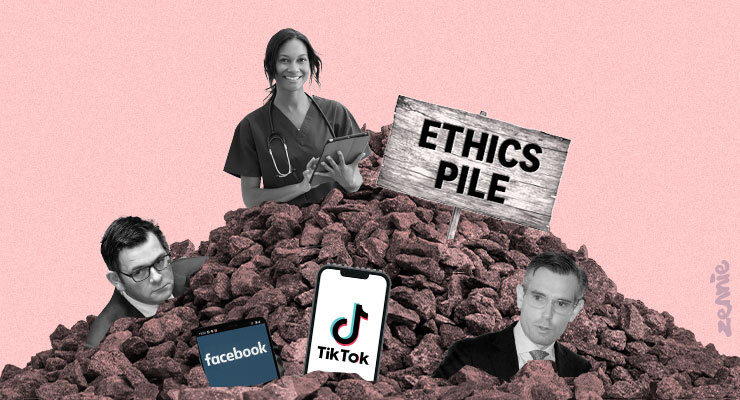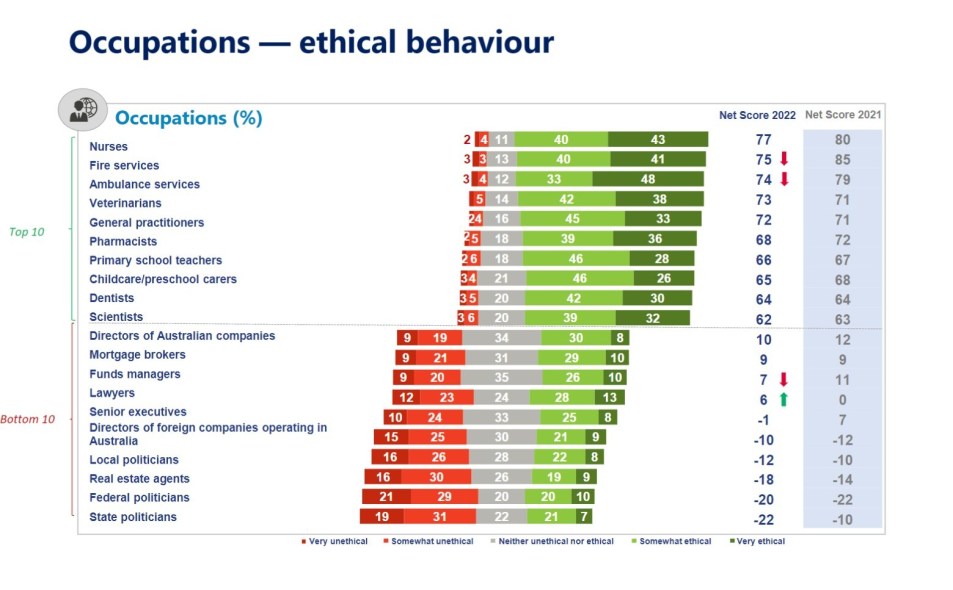
Australia is on a two-year-straight ethical decline according to data released today by the Governance Institute of Australia. The annual survey of 1000 people saw the nation slide down the morality metric — formally known as The Ethics Index — from a modest 45 last year to a meagre 42 this year. In 2020, the country came in at 52.
The index has been running since 2016 and serves as a stocktake of “ethical issues and conduct” in Australian society. In short, it’s a who’s who of principled and sub-par occupations, organisations and sectors, and a pitch for future challenges.
So who’s dragging us down and propping us up?
At the bottom of the occupation pile are state politicians. Deemed the “least ethical occupation”, they scored -22. That’s a 10-point reduction from last year and a 24-point reduction from 2020. Federal politicians did marginally better with a score of -20, while real estate agents came in third last with -18.
Other big names in the “bottom 10” include senior executives and mortgage brokers. Clear crowd favourites.

The occupations worth their weight in gold — and stature — are overwhelmingly in health, emergency services and education. Nurses topped the charts with a net score of 77, followed closely by fire services at 75 and ambulance services at 74. The same three occupations scored a podium finish in 2021, but the incumbent (fire services) failed to secure gold a second year running.
From an organisational standpoint, TikTok came in last with a net score of -32. It’s joined by other big tech — Facebook, Twitter, Instagram — in the bottom 10. Note that the survey was conducted between August 29 and September 8 2022, before Elon Musk took over the reins at Twitter.
Pathology services specialists were the organisational winners, coming in with a net score of 66. Hot on their heels were primary schools and medical charities with 65 and 64, respectively.
The sector-wide performance has health, education and charities stealing the show as most ethical, and media, large corporations and resource companies trailing the pack.
So what’s the outlook?
By the index’s estimates, Australia is not tracking for an ethical U-turn. Immigration, euthanasia, Indigenous affairs, government policies and stalled action on climate change are the small-ticket top contenders for ethical dilemmas going forward.








Quite surprised to see organised religions not mentioned. Their performance on matters like tax dodging and covering up sex crimes against minors ought to count for something. Their presumption of being above the law whenever it suits them has been a curse on society for thousands of years.
There may be a new member of the cover up club. National sports organisations who have convinced many that an internal enquirey is somehow a substitute for a police or other investigation.
If you invert the graph there is a strong correlation between income and lack of integrity or trust. Our most trusted and admired people tend to be the lowest paid and the least trusted get the big bucks.
True. So is everyone is equally lacking integrity, and the only difference is great wealth brings the freedom and opportunities to behave very badly, or are the lower paid genuinely better people?
No surprise to see real estate agents heading the private sector. (I’m assuming this includes land developers and managers). Very surprised to see the gambling industry didn’t get somewhere in the bottom ten.
What an empty fluff piece.
Started poorly by conflating morality and ethics and continued in that vein by not even explaining how these judgements were arrived at.
Reading between the lines, it’s actually a survey of people’s attitudes, so it’s not measuring ethical behaviour, it’s measuring people’s attitudes to ethical behaviour. All a lower national score might indicate is that the population holds their society to higher ethical standards than in another country – or lower.
Even though, intuitively, the ratings seem about right, there’s so little made clear in this article that it’s hard to come to any conclusions.
Do better, Crikey!
And the next article, by Keane, does it right – “is regarded as” – making it clear this is a survey of attitudes, from which you can’t declare that “Australia’s on an ethical backslide” as the lazy heading has it.
Not so. The article states clearly it is reporting the annual survey of 1000 people by the Governance Institute of Australia for its morality metric — formally known as The Ethics Index. So if you want to question the survey method you should go to the Institute.
What does Bob build? Hope it’s not over us…
The survey only goves poeple’s opinions not how they came to that opinion. In my opinion the media has a huge hand in causing so much distrust with their articles written as fact.
It doesn’t say who the people were and what they were asked. Do they actually have information about ethical behaviour or is it just their perception? Both are valid, but one says something about actual behaviour and the other says something about people’s attitudes. Not the same thing.
There’s not much point in writing an article if I have to dig deep into the source material to find this basic info.
ok. But just stating it’s the result of a survey of public opinion gives me sufficient information to discount its value.
It’s got good value to understand public opinion.
But not good value to back up the lazy assertions in this fluff piece.
I think the Media should top the list since it’s because of what they put out that causes people’s distrust and Crikey has a hand in that with certain opinion pieces put forward as fact.